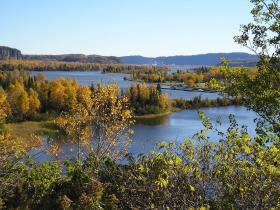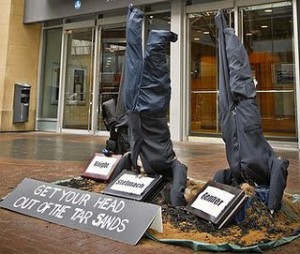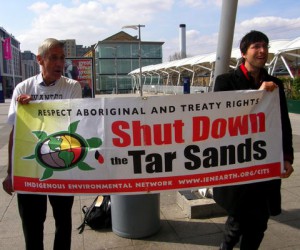Review: Tar Wars – film night with the Coop Bank
Article published: Monday, September 27th 2010
Last week the Cooperative Bank hosted a free screening of BBC documentary ‘Tar Wars’, which tells the harrowing story of a small indigenous community, the Beaver Lake Cree, fighting to save their land from the ravages of rapid oil expansion. Suzie Mitchell reviews for MULE.
As part of the Coop’s latest campaign, the evening proved to be an insightful reflection of the rising mainstream media torch being shone on tar sands extraction in Canada. The event was joined by guest speakers Chief Al Lameman of the Beaver Lake Cree, legal attorney Jack Woodward, and Paul Monaghan of the Cooperative’s Social Goals and Sustainability.
A Canadian “War Zone”
The film covers the Cooperative’s involvement in a legal battle between the Beaver Lake Cree and the Canadian government including a £53,000 donation to the legal costs. They say that this legal battle may be one of the only barriers preventing runaway environmental disaster on an international scale.
In 1876, the Beaver Lake Cree signed a treaty giving ownership of their land to the Albertan government in return of the right to unlimited access to fish, hunt and habitation. The same land is now one of the latest sources of oil. Also known as ‘tar sands’, this type of oil can be extracted via extreme heating of the soil requiring vast areas of deforestation and the production of toxic waste. The process is already causing huge environmental destruction: the Woodland Caribou and Whooping Crane have both dramatically reduced in numbers due to mass removal of their natural habitat; Contamination of surrounding lakes by toxic waste has left many other species threatened; and local habitants claim cancer rates are also on the rise. Attorneys hope to prove that this degradation of the land is in direct breach of the 1876 treaty, since the environmental destruction means that the First Nations peoples cannot fish and hunt as protected by the agreement. The campaign is goes further in its remit, calling for a halt to all current and future investment in tar sands extraction.
“It’s a sad case of greed”- Chief Al Lameman
But this is not just a concern of the Beaver Lake Cree. Not only removing vast areas of the world’s crucial carbon stores in the expansive reduction of Alberta’s Boreal Forests (described as an ‘oxygen tank’ to the world), this form of extraction emits three times as much carbon dioxide as that for conventional oil. With reserves second only to Saudi Arabia, experts fear deleterious consequences both to the region and the planet, should the tar sands be fully exploited.
Currently producing 1.3 million barrels per day, new technologies and development plans from Shell, Total, and BP could rocket production up to 7 million barrels per day, a figure already being granted in licenses.
Paul Monaghan stressed passionately the colossal scale of environmental damage at stake, and his motive in backing the case. “This is next oil rush, and the consequences of it are enormous.” His message was clear: expansion in the tar sands will put us on the brink of uncontrollable runaway global change, and ecological disaster: “This is massive.”
Challenging?
Reflecting on the evening Andrew Garrity from Manchester Climate Action said, “it was good that the film showing had a lot of unfamiliar faces in the audience, not normally at events like these – mostly Co-op workers and members”.
However on the subject of the showings financer he added “Sometimes it felt more like an advert for Coop banking than a documentary and didn’t explore the alternative ways to challenge tar sands extraction in the UK and Canada. But it was still interesting.”
Suzie Mitchell
Tar Wars forms part of the Cooperative campaign ‘Toxic Fuels’ in partnership with WWF-UK, which urges to prevent this £250 billion predicted investment in tar sands by 2020. More information on how to join the campaign can be found at www.co-operative.coop/toxicfuels.
This article is from one of the MULE newspaper volunteers who write and distribute 10,000 copies for free in Manchester. To help keep MULE publishing, you can help by subscribing or giving a one-off donation.
Comments
-
This was a facinating event and listening to Chief Lameman talk about how the tar sands are devastating the Beaver Lake Cree’s lands was heartbreaking. I disagree with Andrew’s quoted comment, other than supporting the Beaver Lake Cree’s legal battle, the campaign to get tar sands fuels banned in Europe was discussed (a joint campaign between the Co-op, WWF, Greenpeace and FoE). And as a Co-op customer and member, I understand the Co-op are the ONLY organisation supporting the Beaver Lake Cree in this vital battle. It is therefore not suprising that the Co-op’s support featured so heavily – the Beaver Lake Cree are understandably appreciative. I find it scandelous that the Beaver Lake Cree are not receiving the broader support they warrent from NGOs in both the UK and Canada – they should be a cause celeb. Well done the Co-op I say.
Comment by Co-operator on September 28, 2010 at 11:07 am -
The Co-op bank runs the website
in order to sell car insurance. It also advertises that it’s car loans are very competitive.
The Co-op also runs a large travel agency which sells flights to palces all over the world.
Cars and planes run on oil. The Co-op bank is in the business of encouraging car and plane use. Don’t be fooled by its cynical eco-stance. It is the same as any other bank. It wants to make money.
Comment by simon on October 5, 2010 at 2:54 pm -
Unfortunately Suzie Mitchell did not report that a young lady in the audience (Laura Bannister, I think) who asked some very pointed questions. Mainly about where the Co-op invests it’s pension fund. And they could not deny they had money invested in companies (RBS, Shell, BP, etc.) which have invested in the Tar Sands. Hypocrisy or what?
Comment by Patrick Sudlow on October 6, 2010 at 6:43 pm -
Well, pending my being fit enough to cycle to London, or having the time to walk there, I’m going to be complicit by using a non-green solution whenever I want to visit my mum or protest in the capital. So well done all those who don’t have the beam in their eye that I suffer from.
As a co-op member I would rather they didn’t sell petrol and were unapologetic about challenging our consumerist culture; but I want the Co-op to grow and don’t want the market left open to Tesco, ASDA and the like who are taking over the petrol stations of Manchester.
As has been said,it’s a reproof to us all that it is being left to the Co-op to fund this fight. Let’s not bicker- let’s get outside the RBS et al and picket them until even the MEN has to cover it!
Comment by Steph. Pennells on October 10, 2010 at 3:06 am
The comments are closed.






